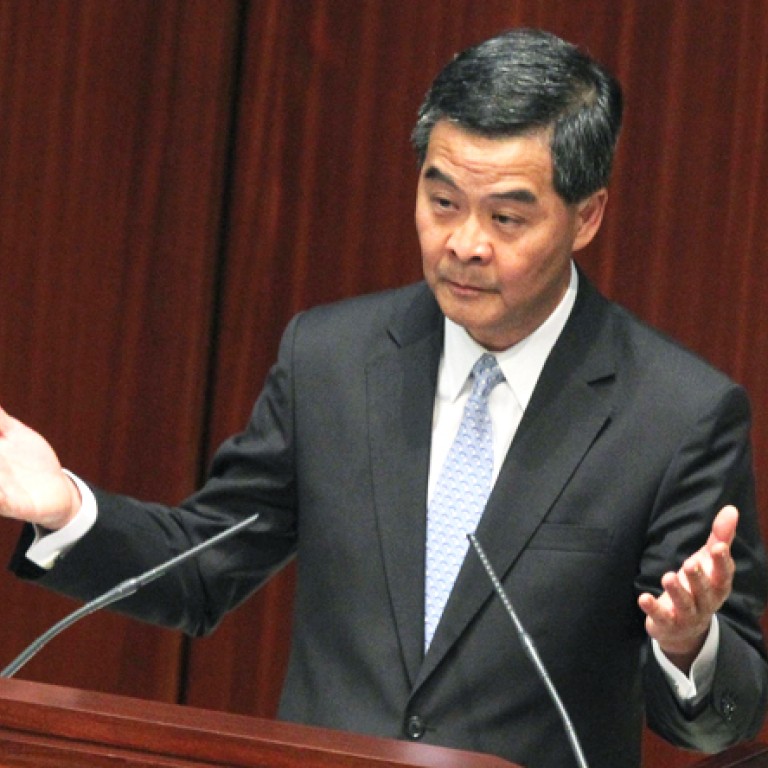
A year on from last policy address, committees are 'dragging their feet'
Some members of groups reviewing issues like housing and standard work hours say pro-establishment interests are blocking progress
Chief Executive Leung Chun-ying's maiden policy address saw the creation or restructuring of many committees to review a range of policies. A year later, the progress these bodies have made will be under public scrutiny when he presents his second policy address on Wednesday.
A total of 16 committees, working groups, authorities and commissions were set up, revamped or proposed under the 2013 blueprint or shortly before its announcement.
Their progress varies widely. Some committees have published papers with specific policy recommendations. These include the Financial Services Development Council, the Commission on Poverty and the Committee on Free Kindergarten Education. The progress of others fell between these two, with meetings held but policy initiatives yet to be announced.
Members have mixed views on the progress of the committees. The Standard Working Hours Committee, for example, is due to launch a consultation exercise this month. The committee will conduct two large-scale surveys with households and employers to collect data on working hours and wages in the first half of this year.
It is scheduled to complete a report summarising the findings of the surveys by the end of this year. But committee members from the business and labour sectors hold contrasting views on its progress.
Stanley Ng Chau-pei, chairman of the Federation of Trade Unions, who heads one of the committee's working groups, said he found the progress "a bit too slow", while Stanley Lau Chin-ho, chairman of the Federation of Hong Kong Industries and head of the other working group, said he was "very satisfied" with the pace.
Ng supports statutory standard working hours and blames the business sector's opposition for slowing down the work. "The government and academics have already conducted a lot of studies on working hours and some of the ongoing studies are repetitive," the unionist said.
"We already compressed the timetable as much as we could, but they always want more time to study the economic impacts of the legislation."
He hopes the report, to be completed by the end of the year, will make a conclusive recommendation so the government can press ahead with legislation. "The last thing we want to see is that the report says there is no consensus, and then the government does nothing."
But Lau warned against rushing into a decision. He said the next report might be no more than an interim one. "It depends on the data collected. If it is not comprehensive, there is no point making this a final report."
He dismissed the suggestion that the business sector was using delaying tactics because of its opposition to the legislation.
There is a similar situation with the Long-Term Housing Strategy Steering Committee, which unveiled a consultation document in September with recommendations for the next decade. The public consultation ended in December and the committee met on Saturday to discuss the way forward.
One member, Fred Li Wah-ming, a former lawmaker, described the group's progress as "acceptable" given that members held very different views. He also said that many of the city's housing problems, such as the long waiting list for public housing, the prevalence of subdivided flats and the shortage of land, could not be solved quickly.
But another member Wong Kwun, president of the Federation of Public Housing Estates, is unhappy with the group's progress. He said official views conflicted with those of the public, hindering decision making.
"A lot of views have been collected from citizens during months of consultation. But the government does not want to do what the public wants it to do, and the public doesn't support what the government wants to do. For example, the public wants to increase the supply of interim housing and is opposed to licensing subdivided flats."
Wong said he was disappointed that official views outweighed those of the public, conveyed to the committee by members.
University of Hong Kong sociologist Professor Lui Tai-lok said the chief executive should lay out progress benchmarks for all the committees, and report to the public what they had or had not done. "The best way is to make a graph listing the progress of all these committees," he said.
